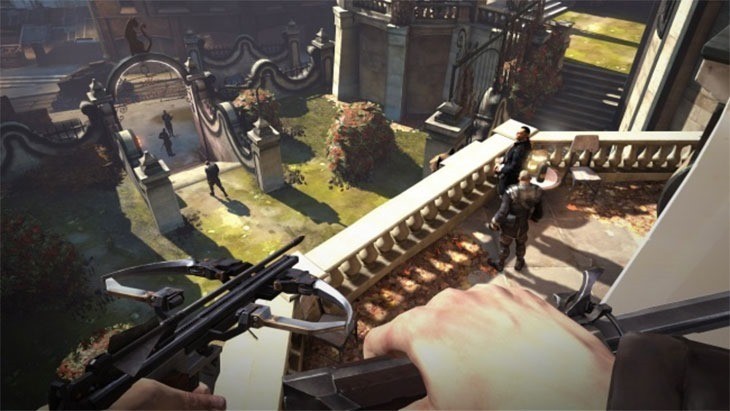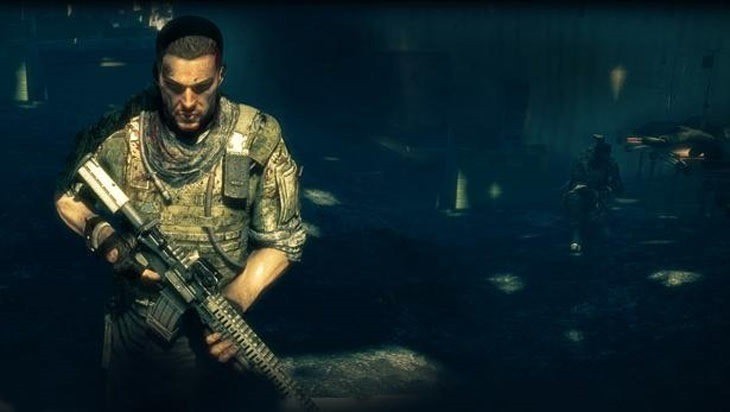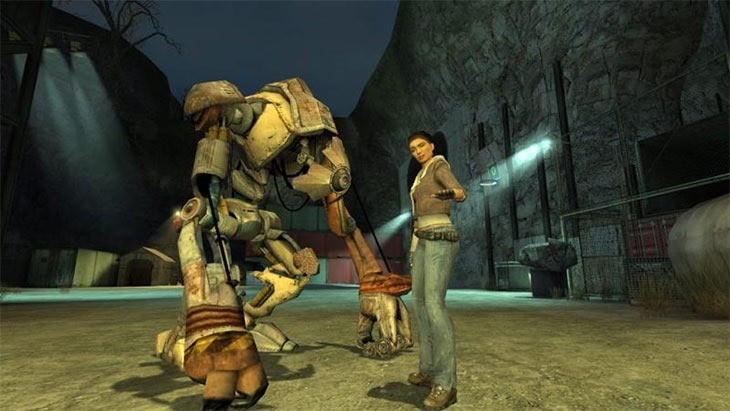
I see it before it happens, not through any skill but because we’ve all reached saturation point: allies morphing into enemies, the knock to the head, the poison, the haziness and collapse, the convenient space and time where my new enemies outline their reasons for their changed morality (which you recognise has been the same morality): whether they monologue like some Saturday morning cartoon villain, or surround me, talking in whispers at my partially conscious form – they helpfully tell me “why”.
The Betrayal is now cemented into games’ plots like Nolan North in the acting credits. But what is meant to be shocking, jolting, what’s meant to pump blood back into the veins of narration, instead only leads to eroding the heart of the story. It’s the zombie infection of plotting, when writers are dragging their feet but still want to make noises at you.
Dishonored is the latest example of a junkie for a game, that’s now infected with this through overuse.
There’s a point where the story should end – when you’ve rescued the Empress and removed the Regent from power – a point where the game’s taken enough hits from the plot to be finished. But no: one more fix, just one more fix of plot to justify our continuing, to justify you buying this game.

And, of course, what’s simpler than just morphing already-established characters into bad ones? What’s easier to motivate you then revenge? Why bother with making new threads when we can twist current ones into new shapes? All this would be fine if betrayal had not been eroded down into a cliché from overuse and could be executed correctly. Instead, it’s tossed in and forced on us and we must continue, with this jarring, frail entity grinning at us, urging us along. One more fix! Come on!
That I have to point out Dishonored is already about revenge makes this all the worse. Revenge is hardly ever handled properly and often descends into boring paroxysms of finding love, of forgiveness, of redemption. Yet Dishonored, in the first two-thirds, handles it beautifully and coldly as Corvo’s blade-abilities: from protector to assassin is an excellent morph. After all, who better to eliminate people than one who knows how best to protect them?
Furthermore, though tasked with eliminating specific targets at different junctures, “non-lethal” options appear – but don’t let these fool you into thinking Corvo is taking a lighter or less harsh touch. There are worse things than death. Such as: being forced to live your life with your stalker; having your tongue cut out, your head shaved and involuntarily thrust to slave-labour underground in your own factory.
As Stephen King said in his novel Desperation, “God is cruel, sometimes he makes us live.” Replace God with Corvo and we have a match.
The plot and Corvo (despite being silent) is well-rounded in this first part. Watching a resistance movement succeed, from behind the scenes and as the lead instigator, is always exciting. A new world is being fashioned from the cage of the previous.
Then the betrayal happens and Dishonored joins the ranks of First-Person Shooters which have hooked themselves up to this cheap fix: Bioshock, Call of Duty: Modern Warfare series, Far Cry 2, Thief 2, and so on. Writers think they’re fashioning something new; they think they’re adding roundness to perhaps largely flat plots and characters. Yet, they’re mistaking roundness for being filled with hot air. They think they’re creating grey from black and white, but instead they’re smudging the plot.
Nowadays a twist for a plot would be having friends remain friends; having enemies remain enemies. Instead, writers are so nervous not to create stock characters, they think friends’ treachery will pull the story from under your feet, to at least keep you motivated. This fear of banality has itself poisoned an otherwise interesting concept. But it also indicates a common problem for writers in all creative mediums: the inability to create proper villains and non-annoying heroes.

Creative franchises which are exceptions are the ones that tend to excel: in games, recently, Spec Ops: The Line takes the usual modern warfare trope and turns it on its head, revealing you as the worst villain of all – despite your apparent noble motivations; in TV, Breaking Bad shows the gradual decline/growth of an ordinary suburban dad into a druglord-supervillain; the film and novel American Psycho, with its excess and narration, from a despicable psychopath makes you as numb to violence as Patrick Bateman is.

But it need not be focused only on the bad guys: This is where, for example, Half-Life 2 succeeded. Alyx is a character I’ve heard some have, quite literally, fallen in love with; her pet, D0g – despite being a robot – conveys the playfulness and loyalty of a hound but rises up to battle the most hardcore of robots. Other friends in the game are genuine individuals, with relationships and worries, who want to help you because they believe in you. Here we also have a resistance movement, minor betrayals, but nothing that detracts from actually building rounded characters with their quirks and individuality and them remaining fast-allies, seeing it through to the bitter end.
Dishonored implements the betrayal in the last hours, tossing it away from the likes of Half-Life 2’s quality and suddenly into the veiny arms of other quick-fix junkies. Everything up to there was rounded, full, and balanced. The betrayal, aside from being obvious, makes you not want to play any further.
It makes you want to rub the laziness off your tired hands so you can stick it back into the writers’ thumbs.
Betrayal is now a cop-out, telling everyone you are too uncreative to think of anything else. The worst part, especially in Dishonored, is that we clearly are not dealing with untalented, uncreative people at Arkane Studios. The game as a whole is testament to that. But the game refused to end. This need to have a long game makes no sense, merely for the sake of extending playtime. Just because the Mona Lisa is smaller than The Last Supper doesn’t make it a less beautiful painting. Indeed, rather 5 strict hours of brilliance, than an extra one made of futility and desperation. The Betrayal has long since become a cliché, a large looming giant swinging his arms across the plot’s landscape: he’s there to upend it, to shift things dramatically.
But, like any giant, most of us can usually see him coming from miles away and would like nothing else than to avoid him completely.
Last Updated: November 16, 2012




















